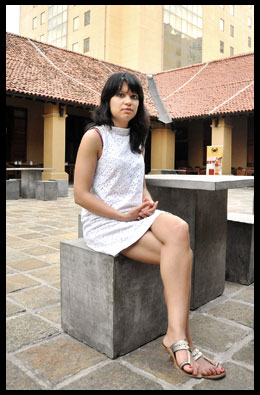Home is not a destination, it’s something within you
View(s):Young Indian author Anjali Joseph speaks of her two novels and the different reactions to them
By Smriti Daniel, Pic by Indika Handuwala
Here to attend last month’s Colomboscope courtesy the British Council, writer Anjali Joseph was in Jaffna shortly after and then in Kandy. For a few hours in the middle, we find ourselves at the Dutch Hospital in Colombo where Anjali confesses that she’s feeling a little disoriented. “I think for an Indian it’s very disorienting to be here in some ways because while things can appear very similar, they really are quite distinct.” In Sri Lanka she recognises echoes of Goa, Pune and Pondicherry; Jaffna for her is tinged with wistfulness and the memory of a riotous sunset. Colombo is clean in comparison to Mumbai, its streets lined with grand old trees. “People here have the time to be polite,” she says ruefully.

As a writer, Anjali is all about a sense of place; Paris, London and Mumbai vie with characters for attention in her novels ‘Saraswati Park’ and ‘Another Country’. The former, her debut, was shortlisted for the Ondaatje Award, the Hindu Best Fiction Award and the Commonwealth Writers Prize, longlisted for the Man Asian Literary Prize and went on to win the Desmond Elliot Prize, the Betty Trask Prize and the Vodafone Crossword Book Award.
In it we meet the middle-aged Mohan who is a letter writer by profession, his services much in demand by illiterate village migrants. He and his wife Lakshmi live in a housing colony named Saraswati Park and that is where their nephew Ashish comes to join them. The 19-year-old begins an affair with wealthy classmate before becoming embroiled in another with his tutor, Narayan.
Anjali who wrote ‘Saraswati Park’ while completing her Masters in Creative Writing from the University of East Anglia says that becoming a writer never seemed inevitable. The stars aligned though when the end of a three year contract and her 30th birthday coincided. “It seemed like a good time to consider writing a book.” She began pulling out books from the library with titles like ‘How to Write a Bestseller’. Several advised her on the wisdom of plotting out her novel on index cards before she began writing, so she bought the index cards, but couldn’t seem to plan a plot.
Another time, a visiting literary agent informed the class that he would never back a book written in two viewpoints – they just didn’t work. Anjali, who was fully committed to Mohan and Ashish by this point, remembers thinking only “oh dear”. Getting under the skin of two men, so wildly different, was a challenging exercise. Anjali has had readers comment on how accurately she had portrayed Ashish’s love affairs, but she laughs as she recounts a friend telling her “A woman will never understand what goes on between two men.”
Anjali is cautious about how she receives praise and she’s had plenty – ‘Saraswati Park’ was showered with critical acclaim, some of it like her inclusion in The Telegraph’s 20 Writers Under 40 list coming before the official launch of the book. “It’s nice that people liked it,” she says, but adds that the more mixed reviews to ‘Another Country’ are an example of why writers (and everyone else) can benefit from having a core of confidence and certainty that isn’t easily shaken. “I think I’m very clear about what is good in my own work,” she says. “It’s rare that I’m too easy on myself. I don’t worry about that.”
It’s a personality trait that seems to have found tangible form in ‘Another Country’, whose protagonist Leela has a great deal in common with Anjali herself, i.e a Cambridge English graduate, living through her twenties in Paris, London and then Mumbai a hybrid of different cultures who doesn’t quite belong in either. “The starting point of the book was how I felt when I was thirty about the previous decade that I’d lived and this experience of my twenties as a kind of detective story to find out who I was and understand how to live my life,” says Anjali, adding that her friends had similar experiences. “
I wanted the narrating voice to sound like someone who could be an older Leela looking back on her life.” More than one reader has commented on how unlikeable Leela is but Anjali intended her to inspire those mixed feelings. “It’s because she’s someone who resembles me, there was this urge to be a little more unsparing.”
Like Leela, Anjali returned to Mumbai in her twenties. “For a long time, it seemed like the only place I would ever feel at home,” she says. (It was as a writer producing ‘colour copy’ for the Times of India that she got to know the city intimately.) Currently, Anjali teaches creative writing at the University of East Anglia in the UK, and says the idea of ‘home’ is no longer tied as tightly to location. “It’s very internal. It’s just about feeling at rest where you are. It’s not about waiting to get somewhere else.”
Follow @timesonlinelk
comments powered by Disqus


















